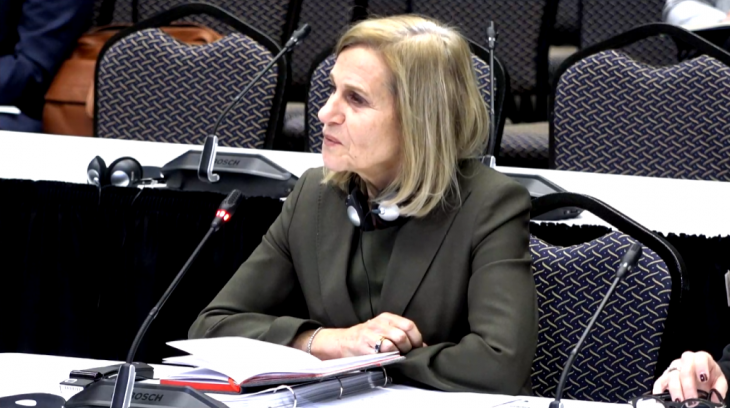
By Ahmad Hathout
Representatives from CBC/Radio-Canada said Tuesday that its decision Monday to eliminate jobs is one reason why it needs to have access to any base contributions made by online platforms.
The public broadcaster said it was eliminating 600 positions and leaving another 200 vacancies unfilled – amounting to roughly 10 per cent of its full-time equivalent staff of roughly 7,900 – as it undergoes a $125-million cost-cutting measure in fiscal 2024-2025.
“Yesterday was a really difficult day at CBC/Radio-Canada,” Dany Meloul, interim executive vice-president of Radio-Canada, told the commission Tuesday. “And I think that if you see the public broadcaster in this position, it really shows you the state of the situation.
“We can see that [Canada Media Fund doesn’t have] enough funds to support all of the applications,” she said, according to simultaneous translation. “The same thing for the independent fund — Radio Canada is without financing for example for podcasts.
“There’s no where we can get financing for podcasts, so of course you have the mandate of news across the country in both languages and in smaller regions, so we really don’t understand [why] we would be excluded from any initial contribution. We have a mandate that’s very clear, that is within the law, and so like other broadcasters, we should have access to that fund.”
When asked whether an influx of new money from base contributions into the system would make a difference to the cuts made, Barb Williams, executive vice-president of CBC, said “possibly.”
She noted that $40 million worth of cuts made Monday were done to the independent production sector – jobs that are not inside the CBC.
She said she spoke with the head of the Canadian Media Producers Association (CMPA), Reynolds Mastin, about the ripple effect this will have on the production sector, including on licence fees that won’t go to production companies. She said the impact that the cuts will have will be far greater than $40 million.
The CBC is pressing for the bulk of the contributions to go to the Canada Media Fund and the the other portion go to Canadian independent production funds. It said targeting specific existing funds is preferable because they are already functional and easy to use and administer.
Williams said the CBC will overall benefit specifically in creating new shows, reach new voices and creators to “build capacity in communities,” allow for more content on streaming platform Gem and more repeats on television.
The commission has heard over the course of the hearing a mini debate on whether online streamers should be able to draw from the funds to which they will contribute if a base financial contribution is required to bolster Canadian content money pools.
Last week Netflix said it should be able to access those funds, even though it is currently opposed to the base contribution idea.
But any base contribution imposed on free ad-supported video-on-demand service Tubi would mean it would have to rethink its operations in Canada, according to the service’s executive vice president and general counsel.
“Smaller, free, ad-supported services like Tubi are not well-positioned to absorb costly new regulatory obligations such as financial contributions,” Carolyn Forrest said in her opening remarks.
That comes from the fact, according to Carolyn, that it’s on razor sharp margins, which was a similar argument made by music streaming service Spotify last week.
Tubi says it is spending a lot of money to licence content and to have Rogers as its exclusive ad sales partner in the country. The service said it spent 40 per cent of its gross Canadian revenues to licence premium content to feature solely in Canada.
“Therefore, Tubi’s business model does not leave sufficient revenue to cover the increased regulatory costs, which are proposed by the CRTC,” she said.
The service is therefore proposing that entities that are doing less than $100 million in Canadian revenue should be exempt from the regulatory regime to be able to compete – a far higher threshold than those proposed by some of the larger Canadian broadcasters, some of which proposed half of that amount.
Screenshot of Barb Williams, executive vice-president of the CBC.


